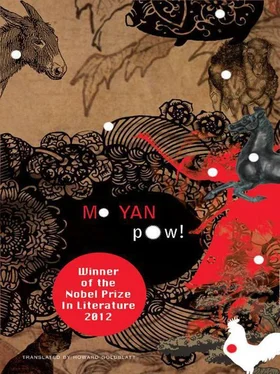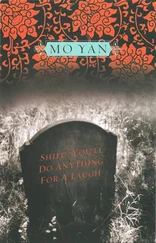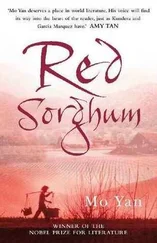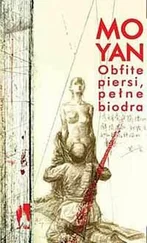A breeze from the north swept across my face and cooled the alcohol's heat just below the skin. Were my parents enjoying the same sensation? I didn't know then; I'd know later. I'd know that my mother belonged to a type of drinker known as hot-and-dry. In the winter she'd drink herself into a heavy sweat and then begin to disrobe: off first was her overcoat, followed by her sweater and then her blouse. Then she'd stop. I'd know that my father belonged to a type of drinker who couldn't stand the cold—the more he drank the deeper he shrank into himself and the paler his face grew, until it resembled window paper or a whitewashed wall. Little bumps would break out over his face, like chicken skin, and his teeth would begin to chatter. When he'd had too much to drink, he shivered like a man struck with malaria; my mother, on the other hand, would break out in a sweat even on the coldest days of winter. For Father, if he was drinking, it could be the dog days of summer and he'd still have the cold shakes, like the death throes of a cicada clinging to the tip of a leafless willow after ‘Frost's Descent’. And so, I assume, while we were seeing Lao Lan and Huang Bao out to the street in the wake of an evening that held such great significance for my family, that breeze comfortably caressed my mother's face whereas my father suffered under its touch, no less painful to him than the slice of a knife or the lash from a whip soaked in salt water. I don't know how it affected Jiaojiao because she'd had nothing to drink.
The sun has slipped unnoticed below the horizon, bringing darkness to the earth. Except for the field across the way, which blazes with lamplight. Fancy cars stream onto the field, flickering headlamps lighting the way, horns announcing their arrival—a scene of wealth and prosperity. The cars disgorge their loads of fashionable ladies and respectable gentlemen. Most are casually dressed, giving an initial impression of men and women of the people when, in fact, designer labels abound. While I narrate events of the past, my eyes miss nothing outside. A fireworks display lights up the inside of the temple. A gilded sheen covers the Wise Monk's face; he looks like he's been transformed into a gilded mummy. The fireworks continue, each explosion rolling my way. Every burst draws oohs and ahs from the upturned faces of observers. Just like the fireworks, Wise Monk—
Moments of enchantment are inevitably brief while those of suffering endure without respite. But that's only one way of looking at things; another is that moments of enchantment last for long periods, since they remain in the memory of the once enchanted, to be revisited at will and, over time, enhanced and improved, gaining in richness, fullness and complexity until, finally, they are transformed into labyrinths that are easy to enter but difficult to exit. Moments of suffering are, by definition, agonizing, so the sufferer avoids them like, as they say, the plague. That's true even if one suffers by accident. If avoidance is impossible, the next best thing is to soften the impact or simplify the effect or, insofar as possible, put it out of one's mind, blurring the edges until it is a puff of smoke easily blown away.
That's how I found a basis for my narrative of a night so fascinating I was loath to tear myself away from it. I could not bring myself to move forward, to relinquish the star-filled sky, the breezy winds from the north and Hanlin Avenue reflecting the light of the stars but, most of all, the wonderful smell left in the air by the two magnificent horses. My body was standing in front of our gate but my soul had left to follow Lao Lan, Huang Bao and that pair of unreal horses. I'd have stood there till dawn if Mother hadn't taken me inside. I used to think that talk of souls escaping from bodies was superstition, utter nonsense, but in the wake of that sumptuous dinner, when those magnificent horses sped out of sight, I gained a true understanding of what it was for the soul to fly away. I felt myself leave my body, like a chick emerging from its egg. I became as pliant and as light as a feather, immune to the pull of gravity. All I had to do was touch my toe to the ground to spring into the air like a rubber ball. In the eyes of this new me, the northern breezes took on form, like water flowing through the air, and I could lie out flat and let them carry me away. I could come and go at will, do whatever I pleased. If I was headed for a collision with a tree, I willed the wind to lift me high in the air and out of danger. If I couldn't avoid a head-on encounter with a wall, I willed myself into a thin sheet of nearly invisible paper and passed through a gap too small to be detected by the human eye.
Mother dragged me back into the yard and closed the gate with a loud clang, forcing my soul to reluctantly return to my body. Without fear of exaggeration I can say that my head was chilled when my soul made its way in, much like the feeling a child experiences when he slides under a warm comforter after being out in the cold. If you're looking for proof of the existence of the soul, there it is.
Father carried Jiaojiao, who had fallen asleep, to the kang , where he handed Mother the red envelope. She opened it and took out a fistful of hundred-yuan notes, ten altogether, and looked extremely nervous. With a glance at Father, she spat on her hands and counted the notes a second time. Still ten—a thousand yuan.
‘That's too much for a greeting gift,’ she said, with another look at Father. ‘We don't deserve this.’
‘Don't forget Xiaotong's,’ he said.
‘Let me have it,’ she said, now angry.
I hated to but I handed it over. First she gave it a quick count, as with the other envelope, then she spat on her hands and counted it more carefully. Again, ten hundred-yuan notes, a thousand yuan.
In those days, two thousand yuan was a great deal of money, which is why the thought of lending Shen Gang two thousand yuan, never to be returned, had caused Mother such grief and indignation. Back then, you could buy a water buffalo strong enough to pull a plough for seven or eight hundred; a thousand was enough to buy a mule to pull a big wagon. Lao Lan had given Jiaojiao and me enough money to buy two mules. During the land-reform period, any family that owned two adult mules would, without question, have been counted as part of the landlord class and bad times would be waiting just round the corner.
‘Now what do we do?’ Mother mumbled, her forehead creased with worry, like an old woman of seventy or eighty. Her arms were stiff and her back was bent, as if what she held in her hands were bricks, not money.
‘Why not return it to him?’ Father said.
‘How?’ Mother asked, clearly worried. ‘You want to do it?’
‘Send Xiaotong,’ he said. ‘Nothing shames a child, and he won't find fault with the boy.’
‘I say you can shame a child!’
‘Then you decide,’ said Father. ‘I'll do whatever you say.’
‘I guess we'd better hold on to it for the time being. We were supposed to be treating him to a meal. But he not only supplied us with carp soup and shark's fin dumplings, he also handed us a gift like this.’
‘That shows he's serious about wanting to mend the relationship,’ said Father.
‘If you want the truth, he's not as petty-minded as you think. When you weren't here, he helped us out quite a bit. He sold me that tractor at scrap-metal cost and didn't ask for anything to approve the foundation of the house. Lots of people gave gifts right and left but still didn't get their approvals. If not for him, this house would never have been built.
‘All on account of me,’ Father said with a sigh. ‘From now on I'll be his advance foot soldier and repay a favour with a favour.’
‘This money is not to be spent. Put it in the bank,’ Mother said. ‘We can send Xiaotong and Jiaojiao to school after the New Year's holiday.’
Читать дальше












